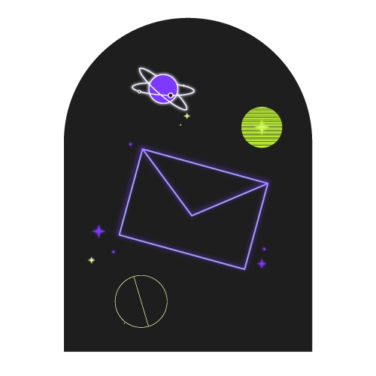The tech world is moving faster than ever. Continuous learning is essential to stay ahead of the curve. In this article, we'll explore 14 of the best programming courses available in 2025, covering a wide range of programming languages, frameworks, and technologies. From mastering the fundamentals of Python to delving into advanced machine-learning techniques, these courses offer something for everyone.
Let's dive in and explore the best ways to upskill in 2025. Here's a summary of each course to help you learn who it's for and why it's great.
Best Programming Courses Shortlist
Here's my shortlist of the best programming courses I think are helpful:
- CS50's Introduction to Programming with Scratch (Harvard University)
- Introduction to Computer Science and Programming Using Python (Massachusetts Institute of Technology)
- C Programming: Getting Started (Dartmouth)
- Learning SQL Programming (Scott Simpson)
- Computer Programming for Everyone (University of Leeds)
- Python Programming: Basic Skills (Codio)
- Data Science on Microsoft Azure using R Programming (FutureLearn)
- Programming Fundamentals (Duke University)
- Intermediate Python for Non-Programmers (Jill McEachern)
- Master PLC Programming (Alison)
- Programming Basics (Great Learning)
- Intro to Programming (RMIT University)
- Programming II (Open Polytechnic)
- Computer Programming (Algonquin College)
Find more details about each course below.
Overview of the Best Programming Courses
1. CS50's Introduction to Programming with Scratch (Harvard University)
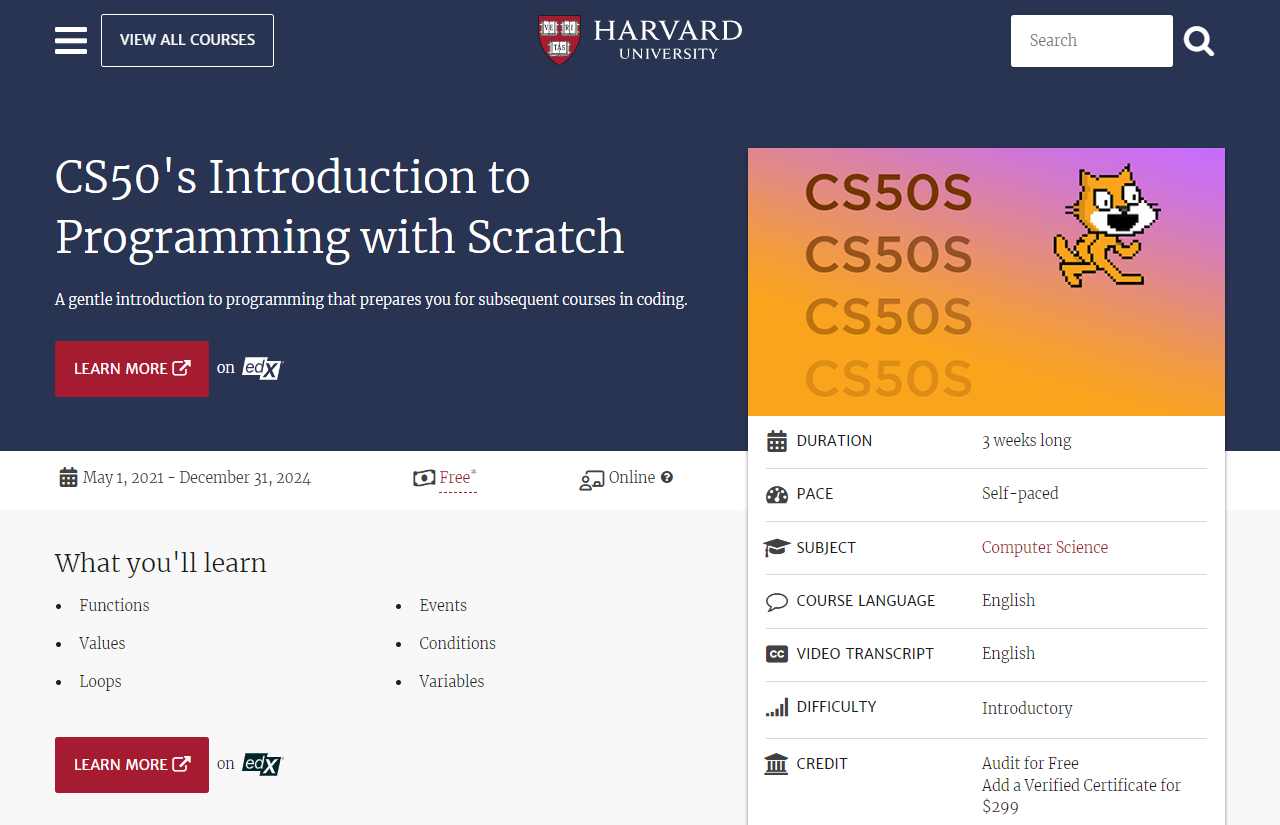
This course teaches programming with Scratch, a visual language in which you create code by dragging and dropping blocks, like fitting puzzle pieces together. It’s an excellent start for beginners with no experience, letting you design animations, games, and interactive stories.
- Who It’s For: Beginners with no programming experience looking for a fun, visual way to learn to code
- Topics Covered:
- Basic programming concepts
- Animation design
- Game development fundamentals
- Interactive storytelling
- Problem-solving skills in programming
- Online, In-Person, or Both? Online
- Exam Required? No
- Duration: 3 weeks
- How Many Hours Of Instruction: Self-paced
- Eligibility Requirements: None
- Price:
- Free
- Add a verified certificate: $299
Take The Course: Harvard University
2. Introduction to Computer Science and Programming Using Python (Massachusetts Institute of Technology)
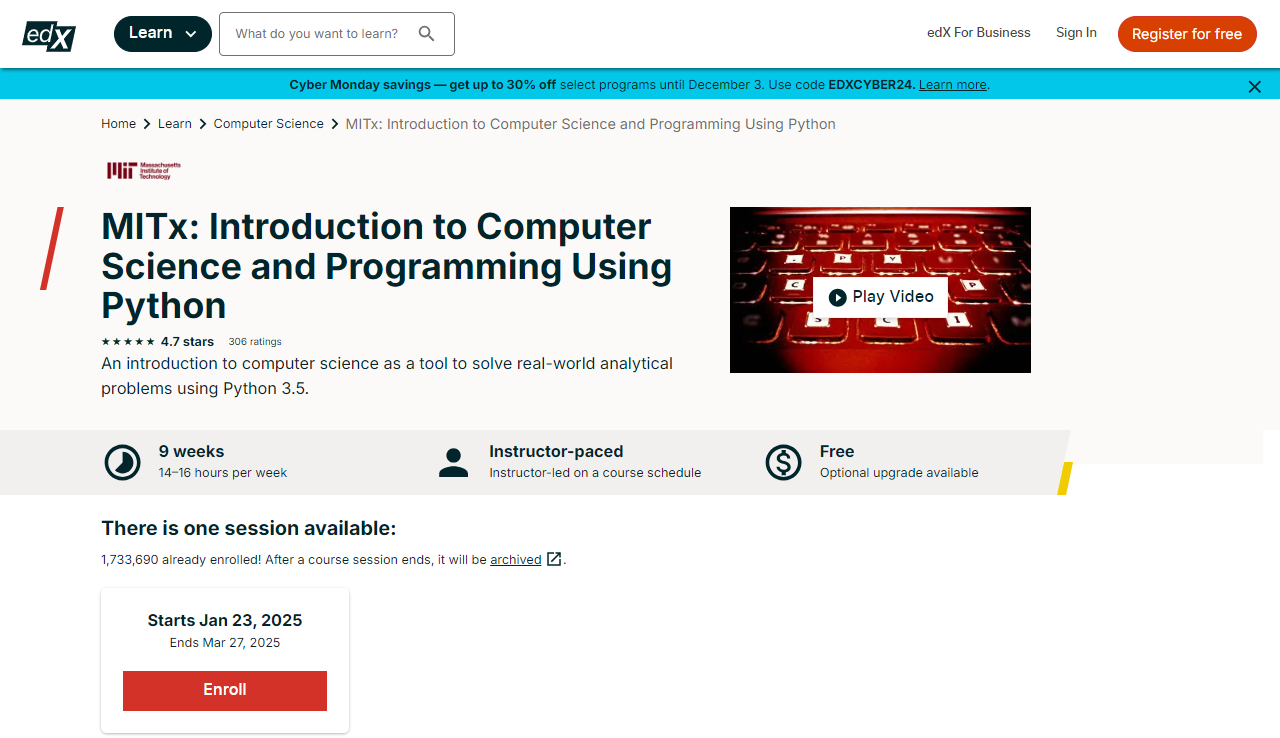
This course is the first step in learning to think like a computer scientist and solve Python problems. It’s perfect for people who have never done any programming before. By the end of the course, participants will be able to write basic programs and understand how to use code to tackle real-world problems.
- Who It’s For: Individuals with a high-school math background
- Topics Covered:
- Computation concepts
- Python programming
- Basic algorithms
- Testing and debugging
- Introductory algorithmic complexity
- Online, In-Person, or Both? Online
- Exam Required? Yes
- Duration: 9 weeks
- How Many Hours Of Instruction: 14 to 16 hours per week
- Eligibility Requirements: High school algebra and a strong aptitude for mathematics
- Price:
- Free
- With certificate: $149
Take The Course: edX
3. C Programming: Getting Started (Dartmouth)
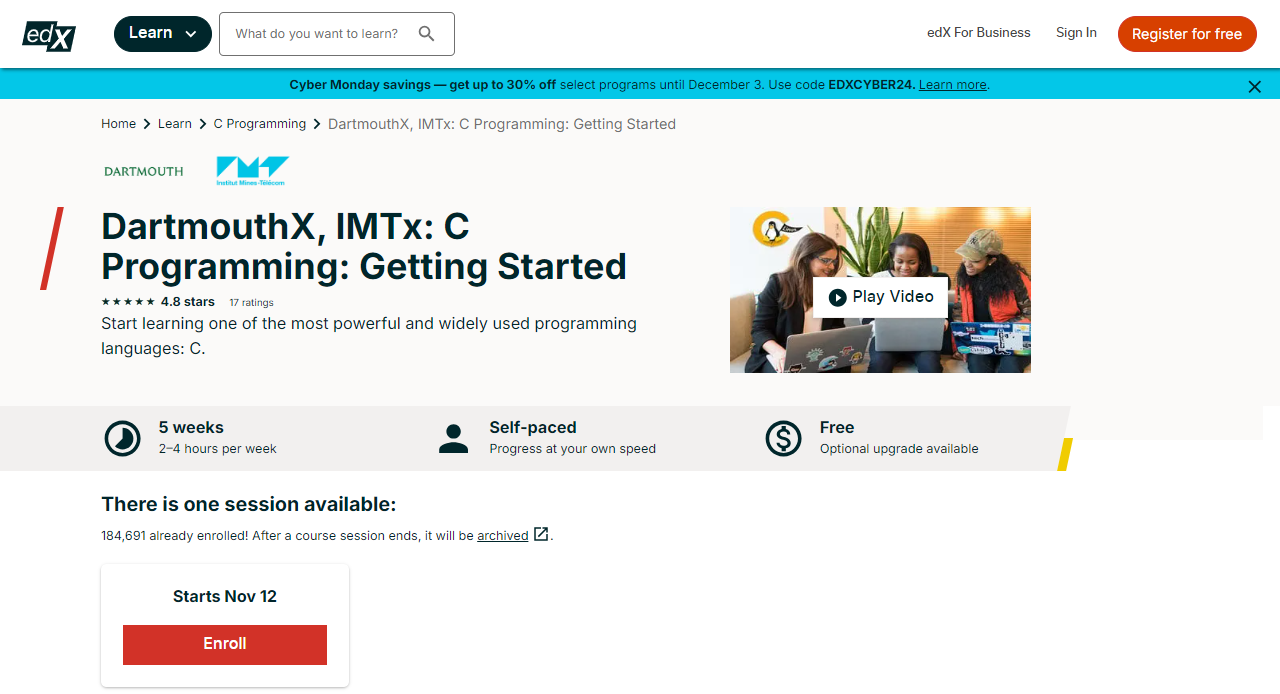
This course will help you start learning the C programming language, even if you’re completely new to coding. It guides you in writing your first programs, doing simple calculations, and seeing how to display the results on your screen. It also teaches how to store information in variables and use loops to repeat instructions, making your programs more efficient and powerful.
- Who It’s For: Beginners interested in learning the basics of C programming
- Topics Covered:
- Basics of C programming
- Writing and running simple programs
- Performing computations and printing results
- Storing data using variables and data types
- Using loops and conditional statements
- Online, In-Person, or Both? Online
- Exam Required? Yes
- Duration: 5 weeks
- How Many Hours Of Instruction: 2 to 4 hours per week
- Eligibility Requirements: None
- Price:
- Free
- With Certificate: $99
Take The Course: edX
4. Learning SQL Programming (Scott Simpson)
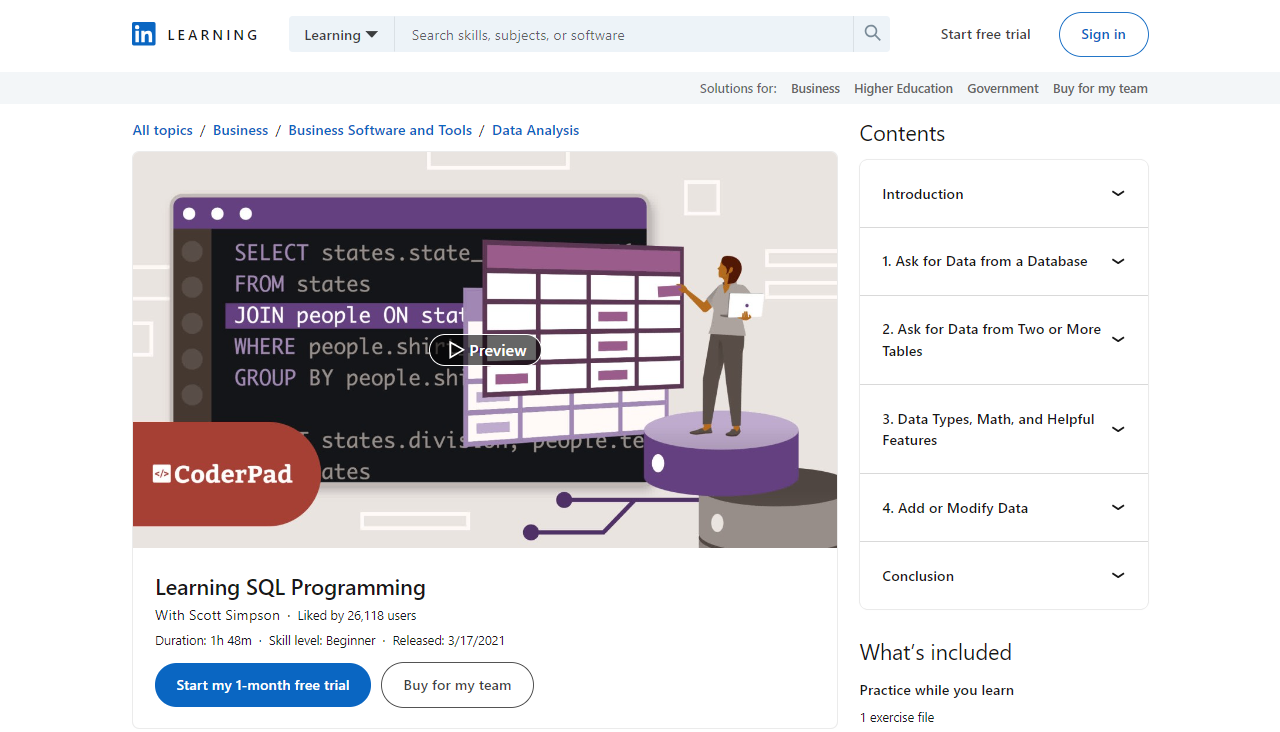
This course introduces you to SQL, a key tool for retrieving and working with data from databases. It teaches how to ask for specific data, sort and organize it, combine data from multiple tables, and make changes like editing or deleting information. Instructor Scott Simpson also guides students through basic math operations and shows them how to format data differently, making it easier to work with.
- Who It’s For: Beginners and professionals looking to understand SQL
- Topics Covered:
- Basics of SQL syntax
- Retrieving data from databases
- Sorting and filtering results
- Using joins to combine tables
- Editing and deleting database entries
- Online, In-Person, or Both? Online
- Exam Required? No
- Duration: 1 hour and 48 minutes
- How Many Hours Of Instruction: Self-paced
- Eligibility Requirements: None
- Price: Free
Take The Course: LinkedIn Learning
5. Computer Programming for Everyone (University of Leeds)
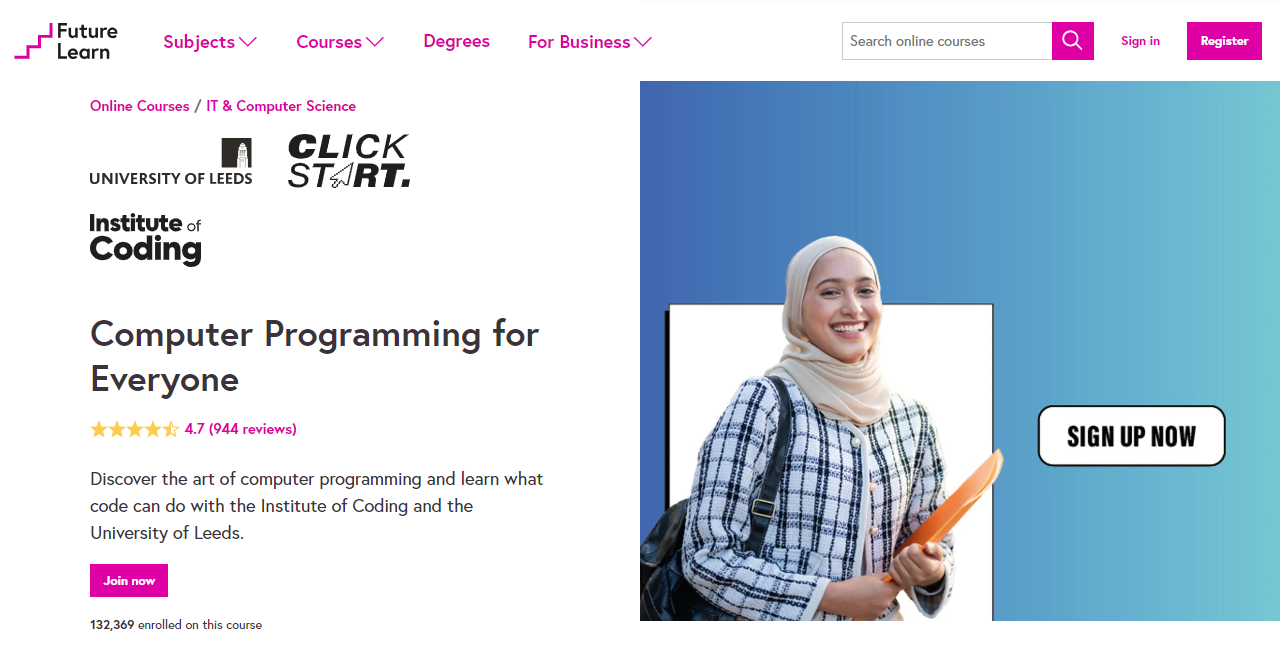
This course shows how and why people program computers, making it easy for beginners to understand. It starts with a simple block-based coding language to solve problems and demonstrates how computers can help. Ultimately, it guides you to try out what you've learned by writing your basic computer programs.
- Who It’s For: Beginners curious about programming and how computers solve problems
- Topics Covered:
- Key developments in computing
- Capabilities of code
- Basic programming concepts
- Writing simple code
- Solving problems with code
- Online, In-Person, or Both? Online
- Exam Required? No
- Duration: 2 weeks
- How Many Hours Of Instruction: 2 hours per week
- Eligibility Requirements: None
- Price: Free
Take The Course: Future Learn
6. Python Programming: Basic Skills (Codio)
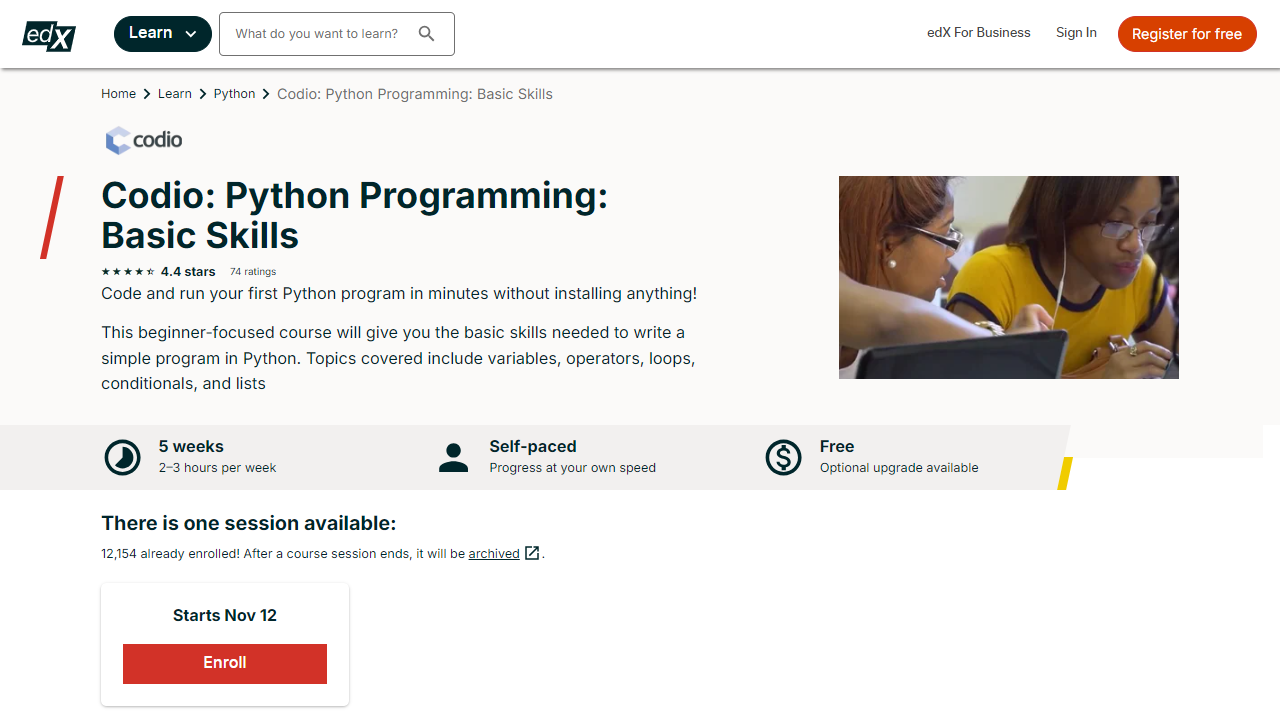
This course is perfect for beginners with no coding experience. It offers a strong foundation in Python and essential computer science concepts. It covers basics like printing, using operators, working with loops and conditionals, and creating lists. These skills are also helpful if you want to learn other programming languages in the future.
- Who It’s For: Beginners wanting to learn Python and core programming concepts
- Topics Covered:
- Basic Python syntax and operations
- Printing and output functions
- Operators and expressions
- Loops and iteration
- Conditional statements and selection
- Online, In-Person, or Both? Online
- Exam Required? No
- Duration: 5 weeks
- How Many Hours Of Instruction: 2 to 3 hours per week
- Eligibility Requirements: None
- Price:
- Free
- With certificate: $189
Take The Course: edX
7. Data Science on Microsoft Azure using R Programming (Future Learn)
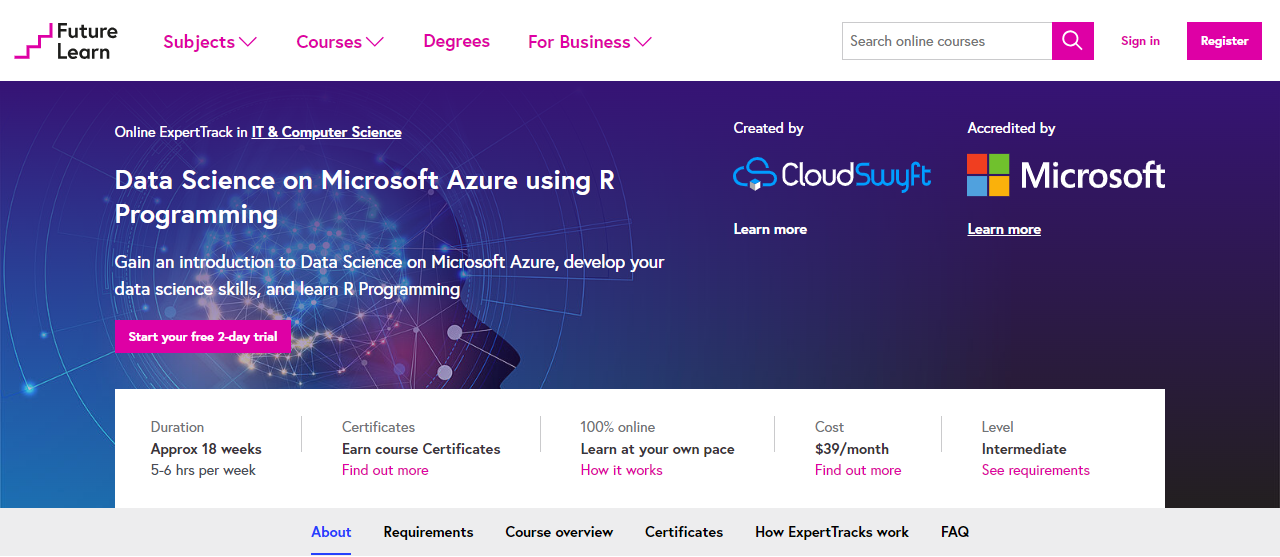
This course teaches you how to use Microsoft Azure and Amazon Web Services (AWS) to enhance your data science work with cloud computing. It covers ways to make data analysis faster and more efficient, essential for business needs. Through hands-on labs, it provides practice with these powerful tools to support your data science projects.
- Who It’s For: Beginners interested in data science
- Topics Covered:
- Basics of data science with R programming
- Introduction to cloud computing on Microsoft Azure
- Managing data in Azure environments
- Using R for data analysis
- Practical labs on Azure
- Online, In-Person, or Both? Online
- Exam Required? No
- Duration: 18 weeks
- How Many Hours Of Instruction: 5 to 6 hours per week
- Eligibility Requirements: None
- Price: $39/month
Take The Course: Future Learn
8. Programming Fundamentals (Duke University)
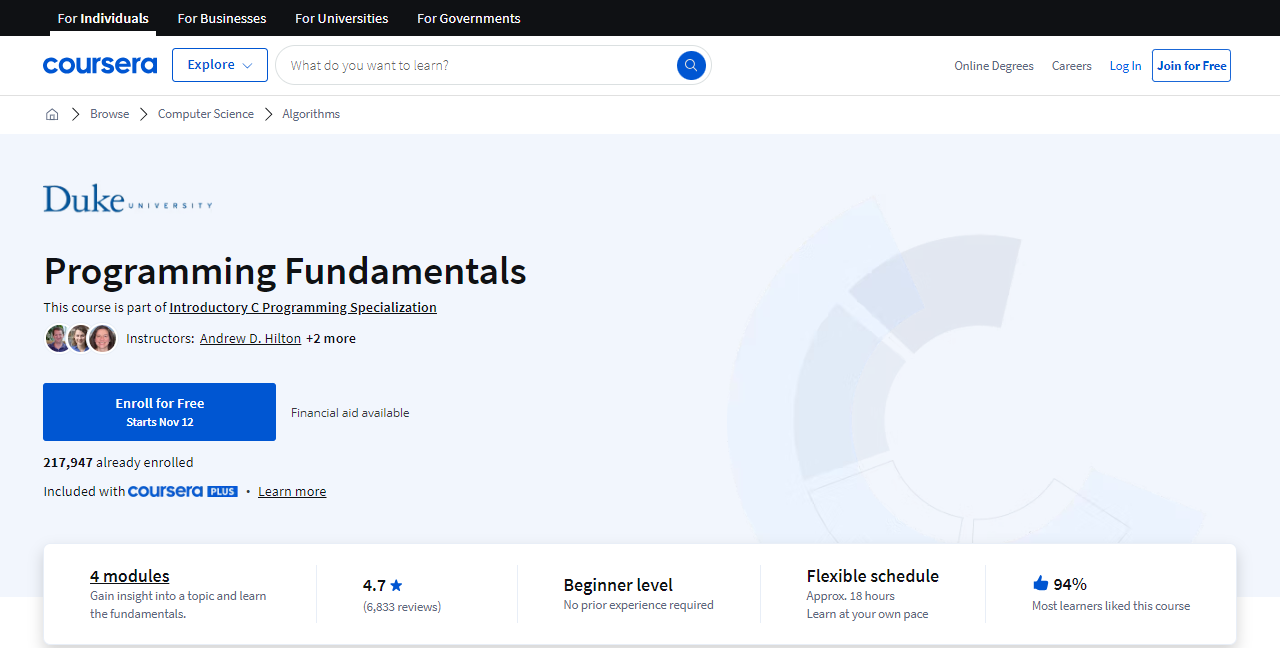
This course is part of the introductory C programming specialization, giving you access to a full series on C programming basics. It introduces new concepts taught by industry experts and helps you build job-ready skills through hands-on projects. Completing the course earns you a certificate to share with potential employers.
- Who It’s For: Those new to programming who want a strong foundation in core coding concepts
- Topics Covered:
- Basic programming concepts
- Writing and running simple programs
- Variables and data types
- Control structures like loops and conditionals
- Problem-solving strategies in programming
- Online, In-Person, or Both? Online
- Exam Required? No
- Duration: 18 hours
- How Many Hours Of Instruction: Self-paced
- Eligibility Requirements: None
- Price: Free
Take The Course: Coursera
9. Intermediate Python for Non-Programmers (Jill McEachern)
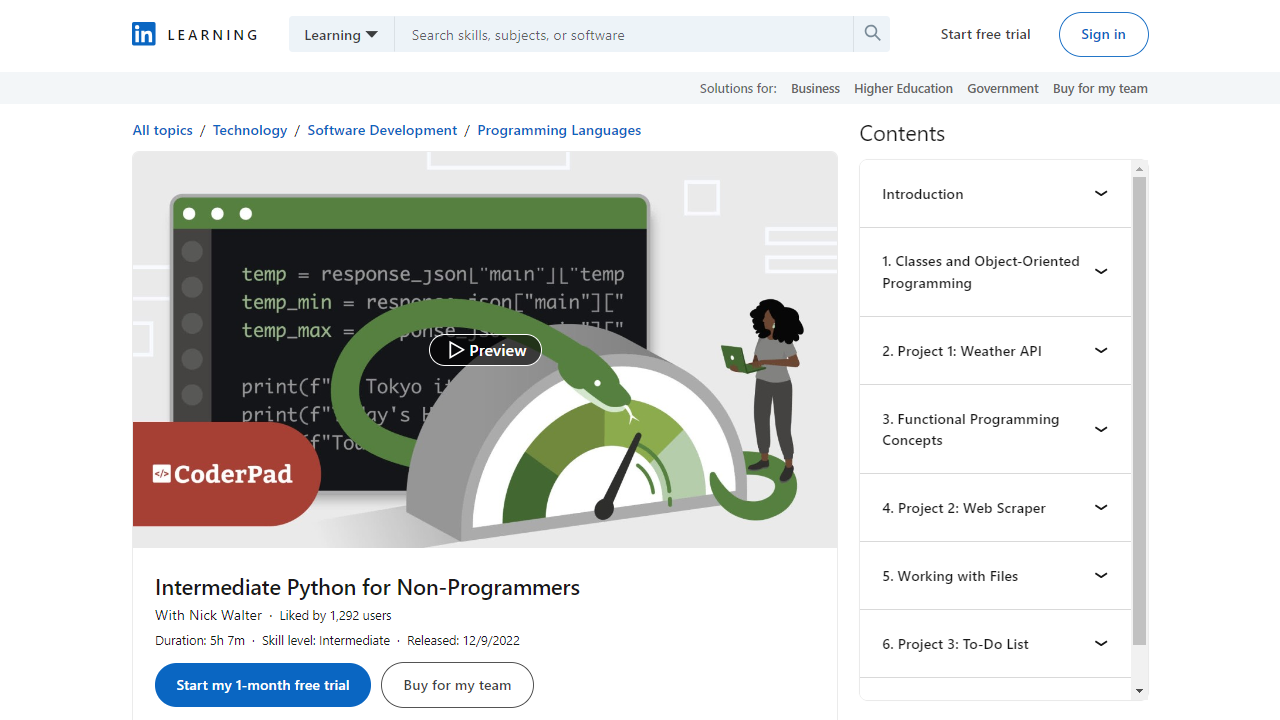
This course, taught by Nick Walter, is an intermediate-level follow-up to Python for non-programmers, perfect for those with little coding experience. It dives into more advanced Python skills through hands-on projects like building a weather forecaster, a web scraper, and a to-do list. These projects help you practice and grow your coding abilities in a simple, approachable way.
- Who It’s For: Those with basic Python knowledge looking to advance their skills
- Topics Covered:
- Advanced Python programming concepts
- Creating a weather forecasting tool
- Building a web scraper
- Developing a to-do list application
- Problem-solving through coding challenges
- Online, In-Person, or Both? Online
- Exam Required? No
- Duration: 5 hours and 7 minutes
- How Many Hours Of Instruction: Self-paced
- Eligibility Requirements: None
- Price: Free
Take The Course: LinkedIn Learning
10. Master PLC Programming (Alison)
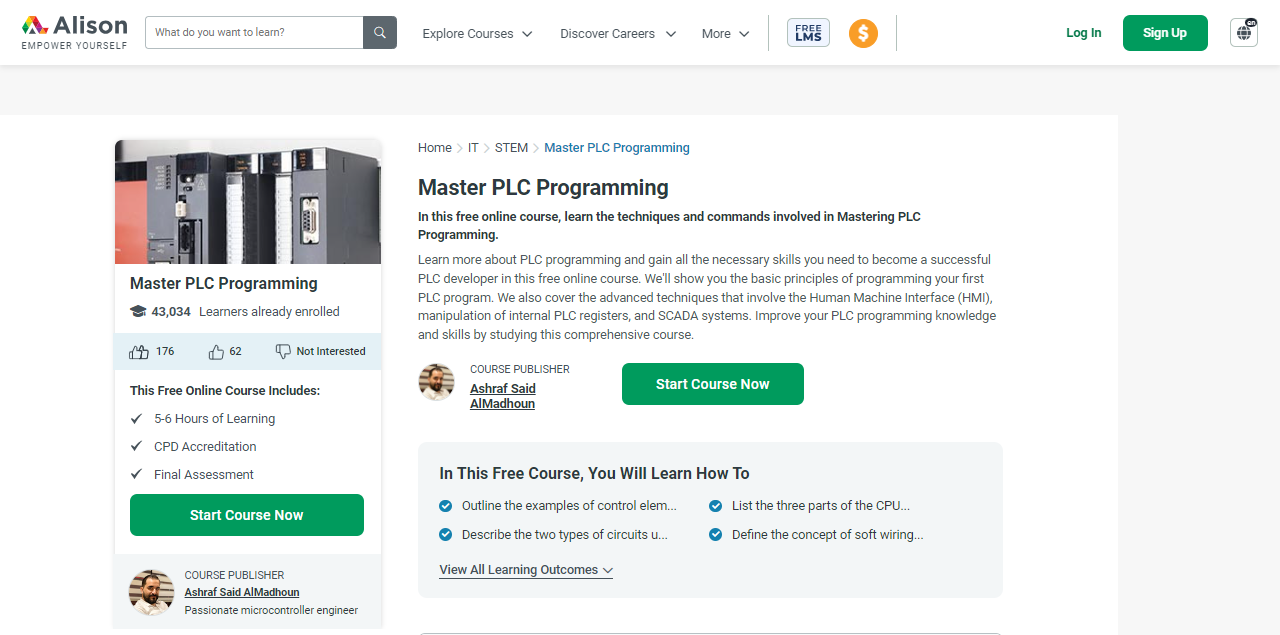
This course helps you learn the skills to become a PLC programmer, starting with the basics. It teaches how to make your first PLC program and explores advanced topics like using control screens (HMI) and managing systems (SCADA). It’s a complete guide to building and improving your PLC programming skills.
- Who It’s For: Beginners and aspiring PLC developers
- Topics Covered:
- Basics of PLC programming
- Creating and editing PLC programs
- Human Machine Interface (HMI)
- Using SCADA systems with PLCs
- Advanced PLC techniques
- Online, In-Person, or Both? Online
- Exam Required? No
- Duration: 5 to 6 hours
- How Many Hours Of Instruction: Self-paced
- Eligibility Requirements: None
- Price: Free
Take The Course: Alison
11. Programming Basics (Great Learning)
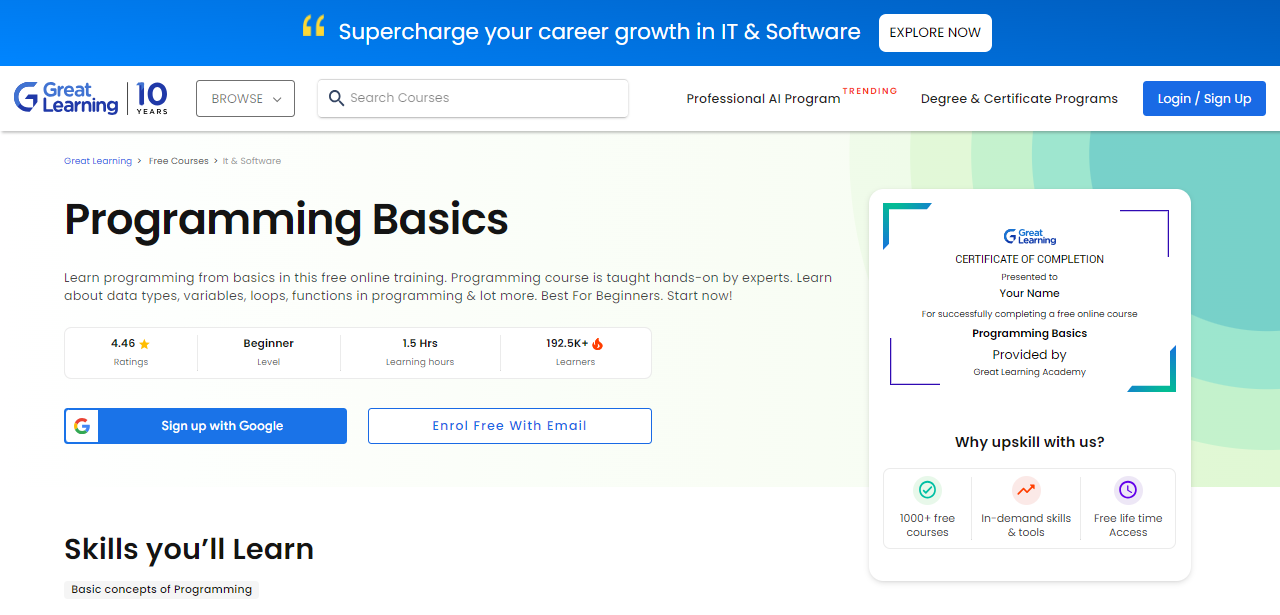
This course teaches you the basics of programming, a key first step for anyone who wants to become a good programmer. This free course covers the foundational ideas common to all programming languages, giving you a strong start before diving into more advanced topics. It’s designed to help you understand the core principles needed to learn any programming language.
- Who It’s For: Beginners looking to learn programming foundations
- Topics Covered:
- Core programming concepts
- Variables and data types
- Control structures (loops and conditionals)
- Functions and modular programming
- Introduction to debugging
- Online, In-Person, or Both? Online
- Exam Required? No
- Duration: 1 hour and 30 minutes
- How Many Hours Of Instruction: Self-paced
- Eligibility Requirements: None
- Price: Free
Take The Course: Great Learning
12. Intro to Programming (RMIT University)
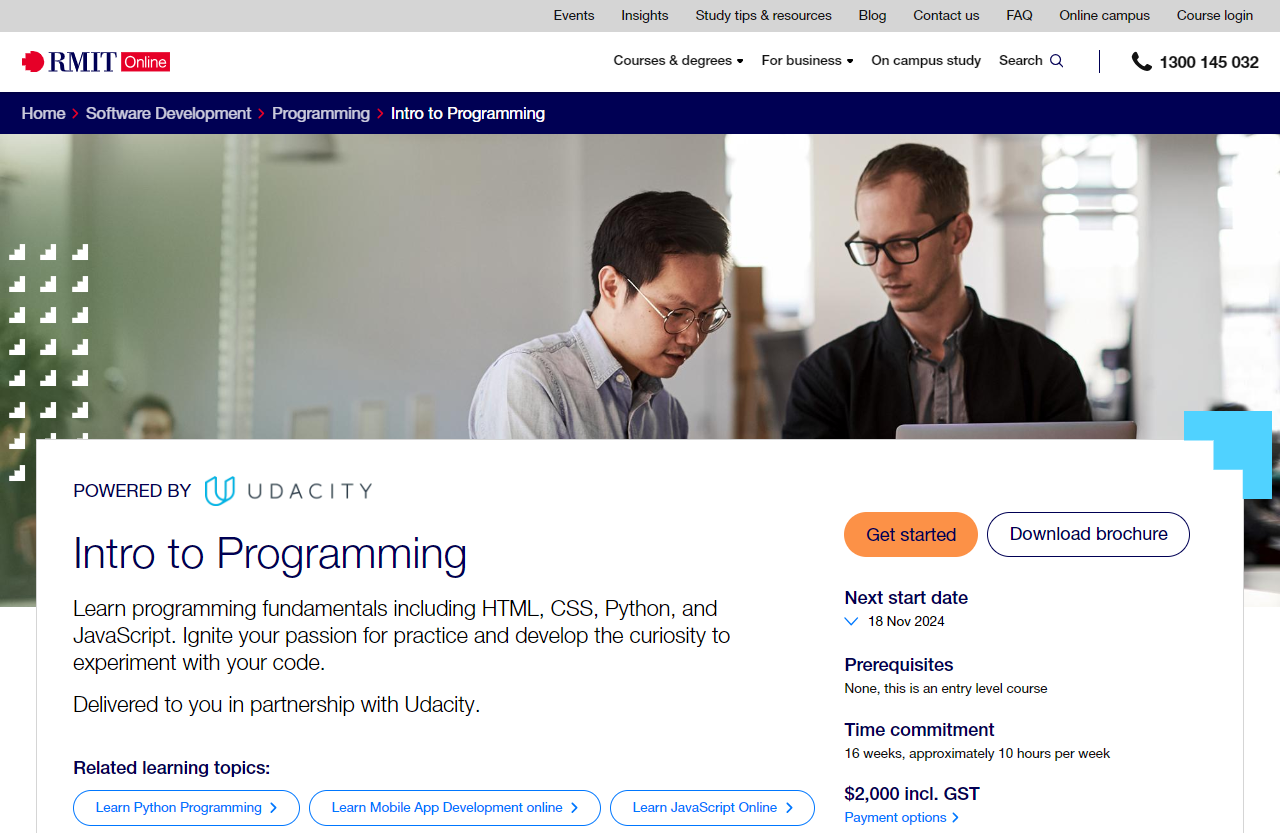
This course is an intro to programming offered in partnership with Udacity, giving you access to Udacity's learning and career services. It also provides support from RMIT Online's Learner Success team to guide you through the course. It’s designed to help you start your programming journey with plenty of resources and support.
- Who It’s For: Beginners wanting foundational skills in programming and web development
- Topics Covered:
- HTML basics
- CSS for styling web pages
- Python programming fundamentals
- JavaScript basics
- Building real-world projects in web development and Python
- Online, In-Person, or Both? Online
- Exam Required? No
- Duration: 16 weeks
- How Many Hours Of Instruction: 10 hours per week
- Eligibility Requirements: None
- Price: AUD 2,000
Take The Course: RMIT Online
13. Programming II (Open Polytechnic)
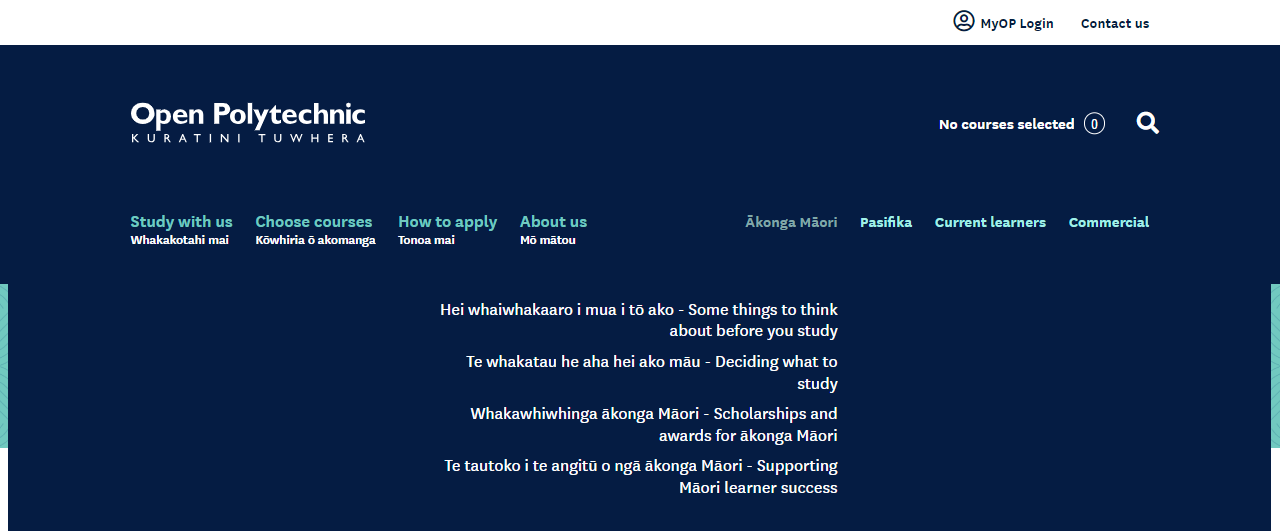
This course teaches how to effectively use a modern programming language and its development tools. It covers key concepts like modular design, object-oriented programming, and common data structures. The course also guides the creation of complete solutions to problems, including design, debugging, testing, and maintenance. It also covers optimization techniques and using version control to manage projects efficiently.
- Who It’s For: Intermediate learners seeking advanced programming and object-oriented skills
- Topics Covered:
- Effective use of a programming language and IDE
- Principles of modular and object-oriented software development
- Use of built-in data structures
- Designing, debugging, and testing software
- Optimization and version control techniques
- Online, In-Person, or Both? Online
- Exam Required? No
- Duration: 16 weeks
- How Many Hours Of Instruction: 13 hours per week
- Eligibility Requirements: None
- Price:
- Domestic: $840
- International: $2,611
Take The Course: Open Polytechnic
14. Computer Programming (Algonquin College)
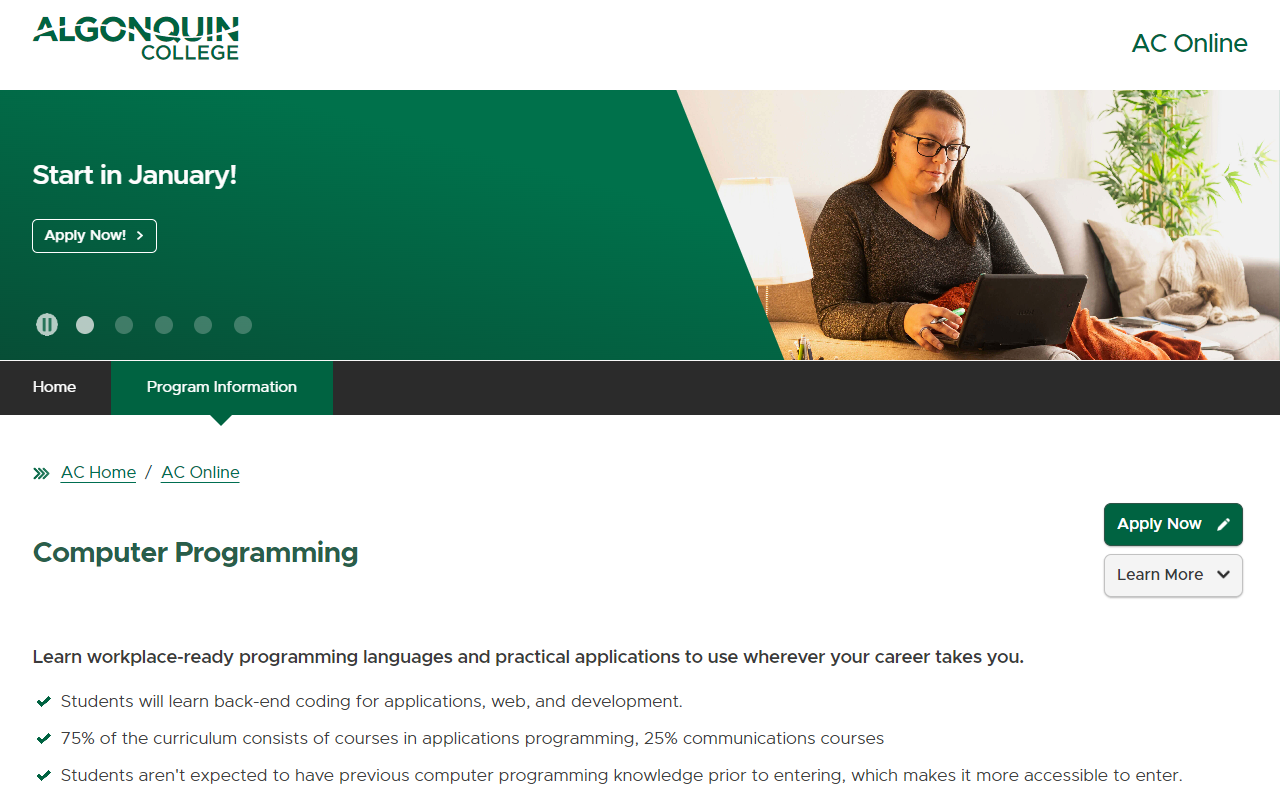
This two-year diploma program prepares you for a career in software development. It covers essential skills like program development, database design, and administration using popular tools like Oracle and CASE. It includes programming languages like Java, COBOL, SQL, and PHP, with hands-on experience in debugging, testing, and maintaining code in real-world environments.
- Who It’s For: Aspiring software developers seeking hands-on programming and database skills
- Topics Covered:
- Program development strategies and object-oriented modeling
- Database design and administration
- Programming languages, including Java, COBOL, SQL, and PHP
- Object-oriented analysis and design
- Debugging, testing, and maintaining code
- Online, In-Person, or Both? Online
- Exam Required? No
- Eligibility Requirements: None
- Take The Course: Algonquin College
What’s Next?
The world of programming is constantly evolving, and staying up-to-date with the latest trends and technologies is essential for success. By investing in these top-notch courses, you'll be well-equipped to tackle the challenges and opportunities of the future. Learning to code is a journey, not a destination. So, embrace the learning process, experiment with different technologies, and have fun!
Boost your SaaS growth and leadership skills. Subscribe to our newsletter for the latest insights from CTOs and aspiring tech leaders. We'll help you scale smarter and lead stronger with guides, resources, and strategies from top experts!


